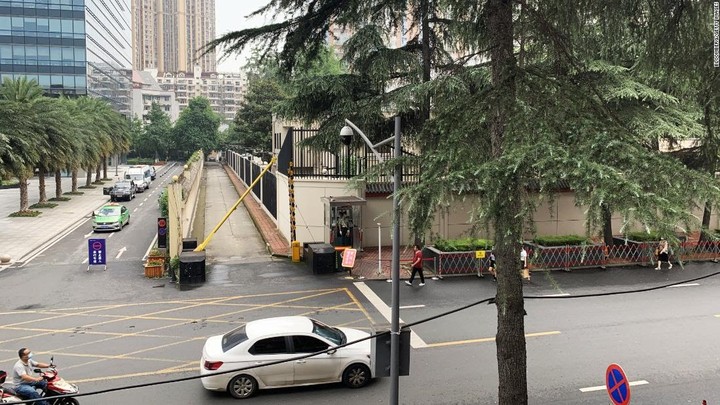
China has ordered the closure of the United States consulate in Chengdu, days after Washington forced the Chinese consulate in Houston to cease operations.
A statement from the Ministry of Foreign Affairs said US diplomats in China had been notified Friday morning that Beijing was revoking the license for the Chengdu consulate in China’s southwest, which has been ordered to “stop all business and activities.”
It added that the US had “unilaterally provoked the incident” by ordering the closure of the Houston office, an action Beijing said “seriously violated international law and the basic norms of international relations.”
“The current situation between China and the United States is something China does not want to see, and the responsibility rests entirely with the United States,” the foreign ministry said. “We once again urge the US to immediately revoke the erroneous decision to create necessary conditions for the return of bilateral relations to normal.”
On Twitter, Hua Chunying, a spokeswoman for the foreign ministry, said the order was “a legitimate and necessary response to the unilateral provocative move by the US to demand the closure of China’s Consulate General in Houston.”
Retaliation
Chengdu, the capital of China’s southwest Sichuan province, is an important diplomatic outpost for the US, covering a large swath of the country, including the Tibetan Autonomous Region.
The consulate was also the site of the dramatic attempted defection in 2012 by Chongqing police chief Wang Lijun, whose actions kicked off a series of events that led to the downfall of top Communist Party official Bo Xilai.
Speaking to CNN ahead of the announcement, James Green, a China analyst at Georgetown and former US diplomat, said that given Washington had recently moved to sanction Chinese officials over human rights abuses in Tibet, “closing the Chengdu consulate might appeal to some.”
Observers had previously suggested Beijing could order the closure of the US consulate in Wuhan, which is informally paired with Houston and the most recent to open in China. But diplomats have not been working from the consulate for several months now, having evacuated early in the coronavirus pandemic. Attempts to return to work were stymied by China’s insistence that diplomats undergo coronavirus testing on arrival, potentially exposing their DNA to the Chinese security services, rather than provide a negative test result.
Effectively, this means that two US consulates in China will soon be out of action, while the Chinese office in Houston is still running as of Friday Beijing time, with the deadline for its closure fast approaching.
US President Donald Trump has suggested he might order the closure of more Chinese consulates, with some officials and the FBI linking the diplomatic outposts to espionage and IP theft by China in the US.
Federal prosecutors are currently seeking a Chinese scientist accused of visa fraud who they say is hiding out in China’s consulate in San Francisco.
The flag of China flies behind a security camera over the Chinese Consulate in San Francisco, Thursday, July 23, 2020.
Rising tensions
Relations between China and the US have plummeted in the past year, amid an ongoing trade war, the coronavirus pandemic, and US criticism of China’s human rights abuses in Hong Kong and Xinjiang.
US Secretary of State Mike Pompeo on Thursday blasted what he said were decades of failed policy towards China, in a speech at the Nixon Library in California.
“As President Trump has made very clear, we need a strategy that protects the American economy and indeed our way of life. The free world must triumph over this new tyranny,” Pompeo said. “The truth is that our policies — and those of other free nations — resurrected China’s failing economy, only to see Beijing bite the international hands that were feeding it. We opened our arms to Chinese





Comments are closed.